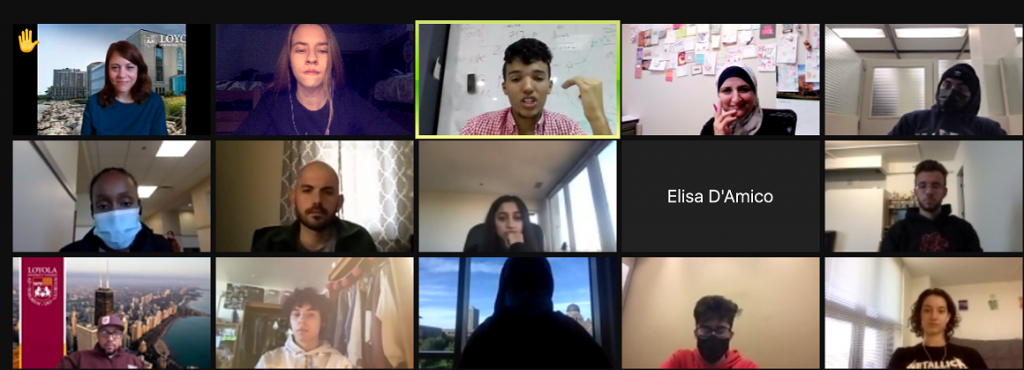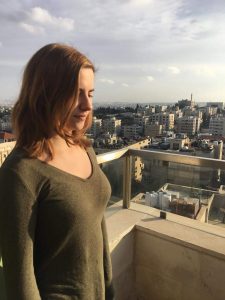
Our Arabic program at Loyola has recently participated in a unique opportunity with a youth created and coordinated program (Teen Teers Team’s Azha Project). This language and cultural exchange project is led by a group of high school students in Libya! At Loyola, we too have been excited to engage in an international opportunity for personal and professional understanding of self and the “Other,” seek interdisciplinary foundations for language and culture exchange, and reflect on becoming conscientious learners and mindful agents in a multi-cultural global context. We hope this project continues to find support and globally empower the youth to be active participants in responsible humanitarian educational developments.
We are indebted to the coordination and planning (across continents) by our enthusiastic Arabic minor student, Solaris Naquin! She is a third-year student at Loyola University of Chicago majoring in Criminal Justice and Criminology with minors in Arabic and Computer Forensics. In her own words, she reiterates her love for languages and learning about fellow citizens of the world!


We are also thankful to Azha group members and the founder, Al-Husayn Alriqaybi, a Libyan 19 year old Engineering and Political science student. He describes himself as a “peacemaker,” an invited participant/speaker to more than 40 cities, and with a record of 100 plus outstanding honors and awards.
Here are a few words from some Arabic students attendees at Loyola:
Andrew (103): Many of the Azha students study and work long hours, and they are still committed to teaching about their language and culture. I came away with a greater appreciation that the youth there are facing many difficulties in Libya. However, rather than fall into despair, they have taken a proactive response. One of the goals of the program is to show that young people both want to and can be leaders at solving problems in society. Support for such initiatives fosters encounter, the basis of true multicultural education. I can read a lot about another culture in a book, but when I have the experience of speaking with a person of that culture, there are new possibilities that have never before been possible
Fareeha (101): Learning a new language and learning about other cultures enhances our understanding of ourselves and that of others. It can help us reduce our biases, advocate for others and reduces the need to rely on other people’s translations and opinions.
 Brandon (101): I’m excited to be involved with the TTT/Azha Project in partnership with my LUC Arabic language studies. The project supports my understanding of myself by giving me first-hand accounts of global points of view. Learning Arabic from international students will help me connect with the Arabic-speaking community and deepen my knowledge of Arab culture.
Brandon (101): I’m excited to be involved with the TTT/Azha Project in partnership with my LUC Arabic language studies. The project supports my understanding of myself by giving me first-hand accounts of global points of view. Learning Arabic from international students will help me connect with the Arabic-speaking community and deepen my knowledge of Arab culture.
Umar (101): Before this webinar I had little idea of Libya, however after, I felt more connected to Libya thanks to the stories Al-Hussein shared and the commonalities between Libya and the rest of the world.

Ricky (101): The TTT/Azha project orientation webinar was an experience that allowed me to better understand my role in society as a student learning Arabic. Learning the language has taught me to be open-minded with life in Arabic-speaking countries and how different societies function. In order to communicate, the Arabic language has opened doors for me to connect with Al-Hussein and Solaris in a life-changing way.
As the Director of the Arabic Program, I’m beyond words in gratitude for all and every opportunity our Arabic learners embark on to grow, engage, and reflect upon our experiential encounters with the world locally and internationally. Such passion is what makes Loyola unique in service and outstanding teaching and learning.

